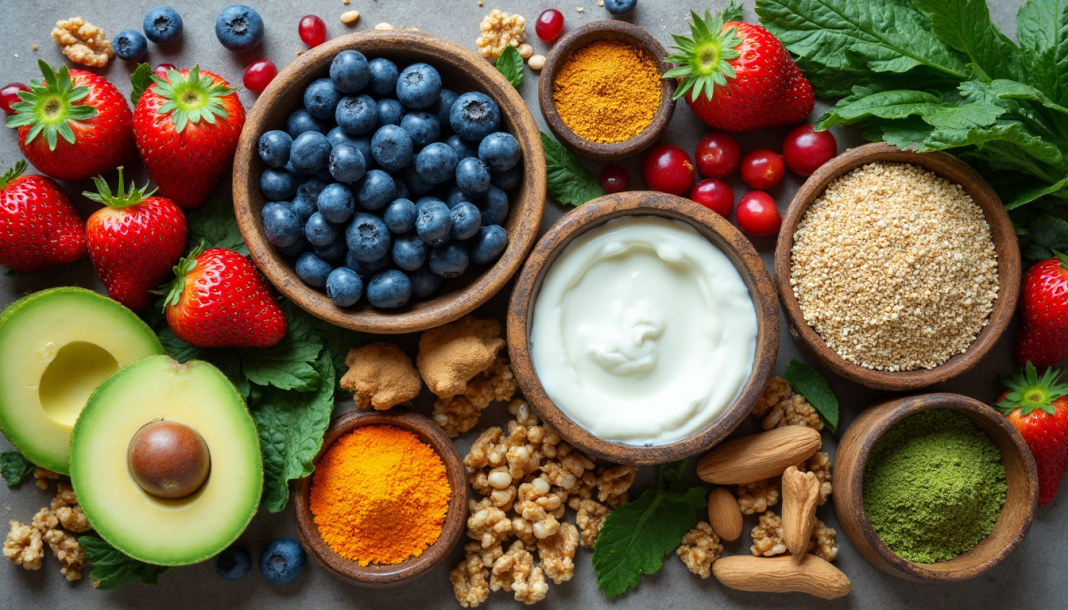You’ve probably seen them splashed across Instagram, featured in smoothie bowls, or headlining your favorite health magazine—superfoods. With names like acai, spirulina, and quinoa, they sound like ingredients plucked from a wellness fairy tale. But here’s the thing: while “superfood” isn’t a term used in scientific journals, many of the foods we call super truly do have superpowers when it comes to nutrition.
As a certified nutritionist, I like to strike the balance between enthusiasm and evidence. So, let’s demystify what superfoods actually are, explore the science behind their health benefits, and most importantly—learn how to incorporate them into your real, everyday meals without blowing your budget or turning into a gourmet chef.
What Are Superfoods – Really?
“Superfood” is more of a marketing term than a scientific classification. That said, the term typically refers to nutrient-dense foods that offer significant health benefits due to their high levels of vitamins, minerals, antioxidants, or other bioactive compounds.
In simpler terms? Superfoods are the overachievers of the produce aisle.
Some of the most recognized superfoods include:
- Blueberries (rich in antioxidants and vitamin C)
- Kale and spinach (loaded with vitamin K, iron, and fiber)
- Salmon (a great source of omega-3 fatty acids)
- Chia seeds (packed with fiber, plant-based omega-3s, and protein)
- Turmeric (contains curcumin, a powerful anti-inflammatory compound)
🧠 Nutrition Fact: Antioxidants in superfoods help combat oxidative stress—a process linked to aging and chronic diseases like cancer, heart disease, and diabetes.
The Science Behind the Hype: Do Superfoods Live Up to Their Name?
Let’s talk facts. The health benefits of many superfoods are supported by real research—but it’s also important to keep expectations grounded. No single food can work miracles. Instead, the real “superpower” comes from consistently including a variety of nutrient-dense foods as part of a balanced diet.
📚 Research Spotlight:
- A study in The Journal of Nutrition found that diets high in berries and leafy greens were linked to better cognitive health in older adults.
- Omega-3-rich foods like salmon have been shown in numerous clinical trials to reduce inflammation, improve heart health, and support brain function.
- Curcumin (from turmeric) has shown anti-inflammatory and antioxidant properties, though it is best absorbed when consumed with black pepper (which contains piperine).
🔍 Key Insight: Superfoods support your health when they’re part of your everyday meals—not as quick fixes or exotic trends.
Busting Superfood Myths
Let’s set the record straight on a few myths that often create confusion or lead to overspending:
❌ Myth 1: You need rare and expensive ingredients to eat superfoods.
✅ Truth: Everyday items like oats, apples, broccoli, garlic, and beans are all super in their own right. You don’t need to hunt down goji berries or shell out for matcha powder to eat healthily.
❌ Myth 2: More is always better.
✅ Truth: Even healthy foods should be consumed in appropriate amounts. For instance, too many chia seeds without water can cause digestive discomfort, and excessive green tea extract supplements have been linked to liver issues.
❌ Myth 3: Superfoods cancel out unhealthy choices.
✅ Truth: No food can reverse the impact of consistently poor eating habits. A balanced diet, overall lifestyle, and mindful eating habits matter just as much as what’s on your fork.
How to Easily Incorporate Superfoods into Your Diet
You don’t need to overhaul your entire kitchen. Here are simple, realistic ways to include more superfoods in your daily meals:
🍓 Add Berries to Breakfast
Toss frozen or fresh blueberries, strawberries, or raspberries into oatmeal, Greek yogurt, or smoothies. They’re rich in antioxidants, fiber, and vitamin C.
🥬 Leafy Greens in Everything
Spinach, kale, and arugula can be added to scrambled eggs, sandwiches, soups, and pasta. Don’t overthink it—just toss in a handful where you can.
🐟 Go for Fatty Fish Twice a Week
Salmon, sardines, and mackerel are full of heart-healthy omega-3s. Bake, grill, or air-fry them for a quick, satisfying protein source.
🌰 Snack Smarter
A small handful of nuts (especially almonds, walnuts, or Brazil nuts) can boost your intake of healthy fats, selenium, and vitamin E.
🌿 Spice It Up
Use turmeric, garlic, cinnamon, and ginger in your cooking. They don’t just enhance flavor—they’re packed with anti-inflammatory compounds and antioxidants.
💧 Hydrate with Purpose
Try green tea for a mild caffeine boost and antioxidant punch, or add chia seeds and lemon to your water for a hydrating, fiber-rich drink.
🛒 Pro Tip: Shop seasonally and locally. Superfoods don’t need to be trendy or imported. Often, the freshest, most affordable nutrient-dense options are growing right in your region.
Everyday Superfood-Infused Meal Ideas
Need some inspiration? Here are a few balanced, superfood-packed meals to get you started:
🌅 Breakfast:
Oatmeal topped with chia seeds, walnuts, and fresh blueberries
- green tea on the side
🥗 Lunch:
Grilled salmon bowl with quinoa, roasted broccoli, kale, avocado, and tahini dressing
🌮 Dinner:
Black bean tacos with cabbage slaw, avocado, and a side of turmeric rice
🥤 Snack or Smoothie:
Spinach, frozen mango, Greek yogurt, ground flaxseeds, and almond milk blended together
These meals aren’t complicated, but they are nutrient-dense, flavorful, and easy to prepare.
Let Superfoods Support, Not Stress You
Superfoods are not magic bullets, but they are powerful tools in your nutritional toolbox. Rather than obsessing over the next “super-trend,” aim to build a consistent, colorful, and diverse diet that supports your energy, immunity, and long-term well-being.
✅ Actionable Takeaways:
- Think of superfoods as nutrient boosters, not miracle cures.
- Focus on diversity and balance, not perfection or restriction.
- Add superfoods to meals you already enjoy for simple, sustainable changes.
- Don’t overlook everyday options like beans, spinach, garlic, oats, and apples—they’re superstars, too.
Start small, stay consistent, and remember: health isn’t built on hype, it’s built on habits.



